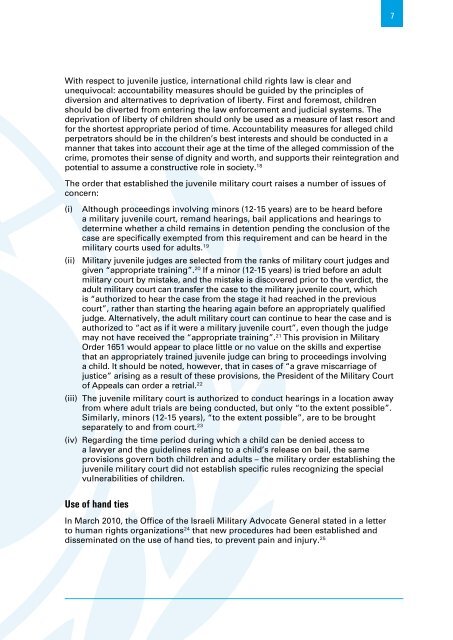Children in israeli Military detention
Children in israeli Military detention
Children in israeli Military detention
You also want an ePaper? Increase the reach of your titles
YUMPU automatically turns print PDFs into web optimized ePapers that Google loves.
With respect to juvenile justice, <strong>in</strong>ternational child rights law is clear and<br />
unequivocal: accountability measures should be guided by the pr<strong>in</strong>ciples of<br />
diversion and alternatives to deprivation of liberty. First and foremost, children<br />
should be diverted from enter<strong>in</strong>g the law enforcement and judicial systems. The<br />
deprivation of liberty of children should only be used as a measure of last resort and<br />
for the shortest appropriate period of time. Accountability measures for alleged child<br />
perpetrators should be <strong>in</strong> the children’s best <strong>in</strong>terests and should be conducted <strong>in</strong> a<br />
manner that takes <strong>in</strong>to account their age at the time of the alleged commission of the<br />
crime, promotes their sense of dignity and worth, and supports their re<strong>in</strong>tegration and<br />
potential to assume a constructive role <strong>in</strong> society. 18<br />
The order that established the juvenile military court raises a number of issues of<br />
concern:<br />
(i) Although proceed<strong>in</strong>gs <strong>in</strong>volv<strong>in</strong>g m<strong>in</strong>ors (12-15 years) are to be heard before<br />
a military juvenile court, remand hear<strong>in</strong>gs, bail applications and hear<strong>in</strong>gs to<br />
determ<strong>in</strong>e whether a child rema<strong>in</strong>s <strong>in</strong> <strong>detention</strong> pend<strong>in</strong>g the conclusion of the<br />
case are specifically exempted from this requirement and can be heard <strong>in</strong> the<br />
military courts used for adults. 19<br />
(ii) <strong>Military</strong> juvenile judges are selected from the ranks of military court judges and<br />
given “appropriate tra<strong>in</strong><strong>in</strong>g”. 20 If a m<strong>in</strong>or (12-15 years) is tried before an adult<br />
military court by mistake, and the mistake is discovered prior to the verdict, the<br />
adult military court can transfer the case to the military juvenile court, which<br />
is “authorized to hear the case from the stage it had reached <strong>in</strong> the previous<br />
court”, rather than start<strong>in</strong>g the hear<strong>in</strong>g aga<strong>in</strong> before an appropriately qualified<br />
judge. Alternatively, the adult military court can cont<strong>in</strong>ue to hear the case and is<br />
authorized to “act as if it were a military juvenile court”, even though the judge<br />
may not have received the “appropriate tra<strong>in</strong><strong>in</strong>g”. 21 This provision <strong>in</strong> <strong>Military</strong><br />
Order 1651 would appear to place little or no value on the skills and expertise<br />
that an appropriately tra<strong>in</strong>ed juvenile judge can br<strong>in</strong>g to proceed<strong>in</strong>gs <strong>in</strong>volv<strong>in</strong>g<br />
a child. It should be noted, however, that <strong>in</strong> cases of “a grave miscarriage of<br />
justice” aris<strong>in</strong>g as a result of these provisions, the President of the <strong>Military</strong> Court<br />
of Appeals can order a retrial. 22<br />
(iii) The juvenile military court is authorized to conduct hear<strong>in</strong>gs <strong>in</strong> a location away<br />
from where adult trials are be<strong>in</strong>g conducted, but only “to the extent possible”.<br />
Similarly, m<strong>in</strong>ors (12-15 years), “to the extent possible”, are to be brought<br />
separately to and from court. 23<br />
(iv) Regard<strong>in</strong>g the time period dur<strong>in</strong>g which a child can be denied access to<br />
a lawyer and the guidel<strong>in</strong>es relat<strong>in</strong>g to a child’s release on bail, the same<br />
provisions govern both children and adults – the military order establish<strong>in</strong>g the<br />
juvenile military court did not establish specific rules recogniz<strong>in</strong>g the special<br />
vulnerabilities of children.<br />
use of hand ties<br />
In March 2010, the Office of the Israeli <strong>Military</strong> Advocate General stated <strong>in</strong> a letter<br />
to human rights organizations 24 that new procedures had been established and<br />
dissem<strong>in</strong>ated on the use of hand ties, to prevent pa<strong>in</strong> and <strong>in</strong>jury. 25<br />
7


